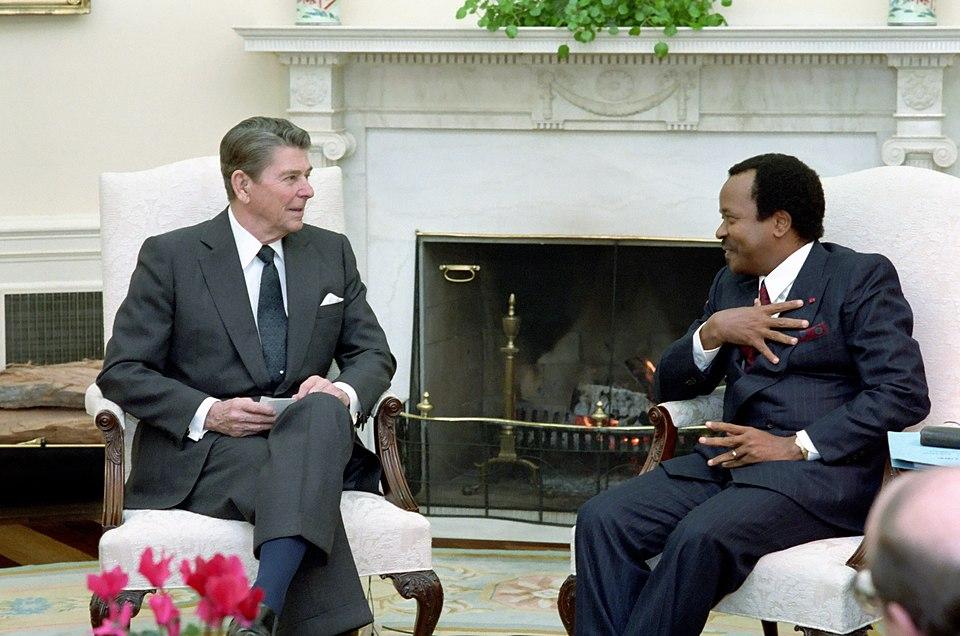
The Gipper praised Cameroonian President Paul Biya’s commitment to free enterprise and openness to U.S. investment, which is the main reason the U.S. still supports him today
On February 27, 1986, President Ronald Reagan held a press conference with Cameroonian President Paul Biya on the White House lawn.
In his remarks, Reagan praised Biya for his sound and dedicated leadership of Cameroon and commitment to the liberalization of the country’s political institutions.
Reagan said: “Today it’s becoming ever more clear to the emerging nations in Africa that Marxist and rigid statist models of development simply don’t work. Instead of economic development, political freedom and national stability, Marxism, an ideology totally alien to African aspirations, has produced nothing but deprivation, tyranny, and conflict.”
Reagan went on: “Cameroon is a shining example of how much can be accomplished when a more realistic and humane approach is taken to political and economic development. By allowing free rein of the enterprise and talents of the people and by providing incentives for them to work and earn, last year Cameroon’s economy grew at an annual rate of over 6 percent. Its per capita income is among the highest in Black Africa. President Biya’s government enjoys a balanced budget, and his country, thanks to the growing vigor of the private sector, is essentially self-sufficient in food. In short, President Biya’s wise policies have been a boon to his people.”
President Biya followed Reagan by stating that he and Reagan had just concluded a meeting that was based on “cordiality and mutual understanding….President Reagan is very much aware of the progress we have made. Our domestic policies are based on a free-market economy and democracy for most personal initiative and the creation of new businesses. Our growth rate has increased considerably. We have opened our border to foreign investors and we have excellent relations with Western nations.”
Biya went on to note that Cameroon at that time hosted about 100 American firms[1] and was generally “fertile ground for American investors. Our two governments have signed an agreement on the reciprocal protection of investments, which will certainly encourage them. Assistance from the American government has been of great help to us, particularly in the fields of agriculture, education, and health.”
The 1986 Reagan-Biya press conference is remarkable to read today given that, in late October 2025 at the age of 92, Biya became the oldest person ever to win a presidential election.
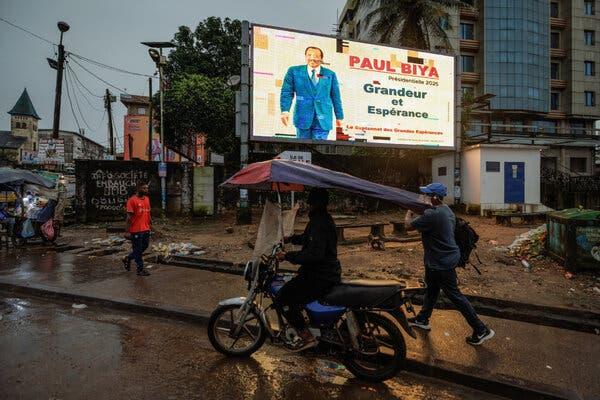
Now serving his eighth consecutive term, Biya first took power 43 years ago in 1982 after having served for a decade as Cameroon’s Prime Minister.[2]
The New York Times reported that opposition candidate Issa Tchiroma Bakary claimed victory two days after Cameroon’s October 12 election, alleging widespread fraud in what he called a “predatory oligarchy.”[3]
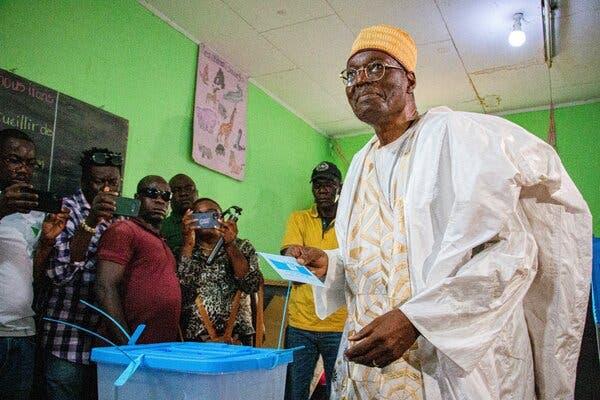
Young Cameroonians refused to accept the election results and staged protests that security forces put down violently, leaving at least ten people dead. Leading opposition figures were arrested and kidnapped in a further attempt to intimidate Cameroonians.
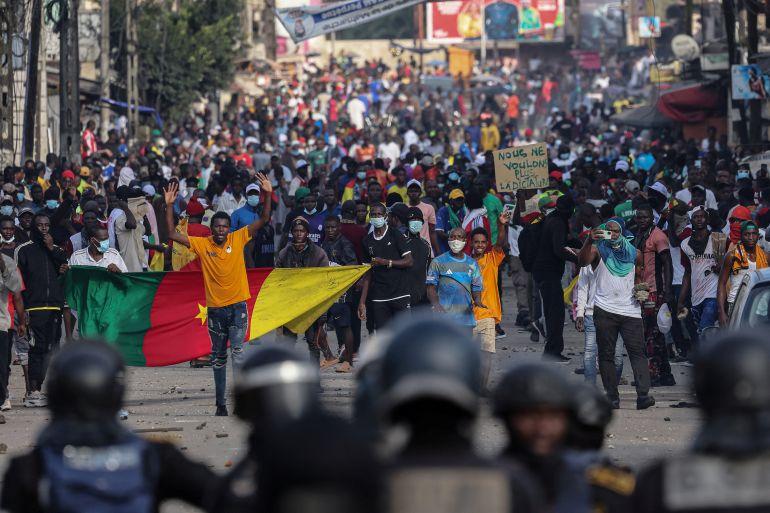
The European Union expressed “deep concern” about the violent repression of protests and U.S. officials raised concern about irregularities in the voting process, though Donald Trump has been silent about Cameroon.
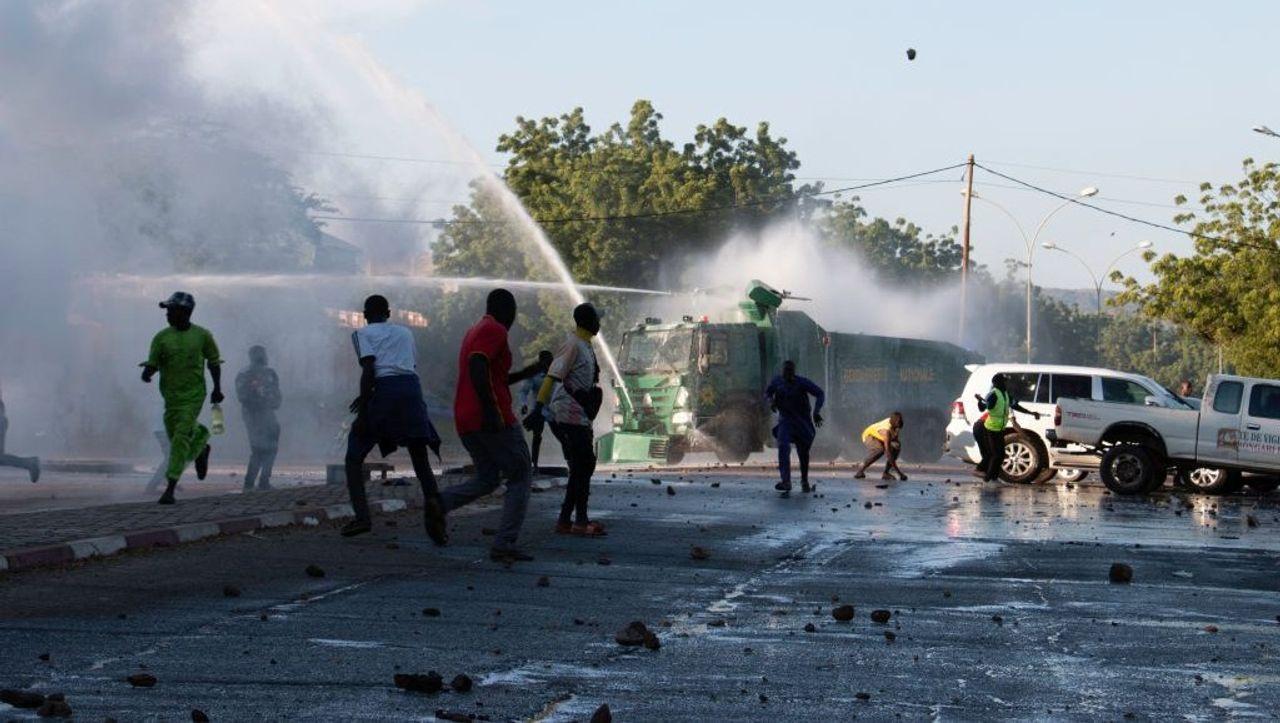
Cameroon’s 2025 election was a replay of 2004 when Cameroonian security forces killed more than 150 protesters after Biya won another rigged election.[4]
Popular resentment against Biya has intensified over the last few years because of his making frequent trips to Switzerland with a large entourage and racking up hotel bills that one investigation estimated totaled around $65 million.
Though Cameroon is rich in natural resources—including oil, natural gas, cocoa, cobalt, aluminum, bauxite and gold—poverty rates increased over the last decade to more than 40% of the population, according to the World Bank.[5]
In the late 1980s, Biya’s government imposed International Monetary Fund (IMF) structural adjustment programs that slashed public spending by nearly one-fifth, froze wages and dismantled large parts of the public sector. This was followed by a privatization campaign in the 1990s and 2000s that deepened unemployment, rural impoverishment and social decay.
The most recent IMF programs renewed in 2017 and extended through this year, continue with the right-wing program of economic austerity, privatization and cuts in public investment, which have resulted in the systematic transfer of wealth from Cameroonians to international creditors and domestic elites.[6] When a new mining code was established in 2023, it mandated only up to 10% state participation in mining companies.
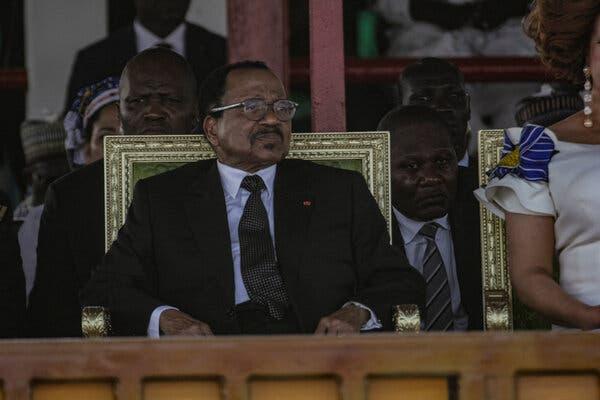
During the recent presidential campaign, Mr. Biya was condemned even by his own daughter, Brenda Biya, who told her TikTok followers not to vote for her father, who she said had made the nation suffer for years.

Nkongho Felix Agbor Balla, a leading Cameroonian human rights lawyer, was quoted in The New York Times stating that Biya could not have won without “massive fraud….People just wanted change, not just because of Biya’s age, but also because nothing is working in the country.”
Serving Dark Forces
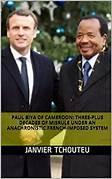
In his 2018 book Paul Biya of Cameroon: Three Plus Decades of Misrule Under an Anachronistic French-Imposed System, Janvier Tchouteu notes that, after serving as prime minister from 1972 to 1982, Biya was given the presidency by his predecessor Ahmadou Ahidjo, who had been imposed on the Cameroonian people by France so it could retain control over the country after it gained independence in 1960.[7]
Ahidjo helped France in the violent suppression of a rebellion led by the anti-colonial, pan-Africanist Union of the Peoples of Cameroon (UPC), whose leaders Ruben Um Nyobè, Felix-Roland Moumié, and Ernest Ouandié were all killed.[8]
Drawing support primarily from the southern-based Beti/Bulu ethnic group, Biya started his career as a nationalist of socialist orientation with the UPC, though as Tchouteu puts it, “discarded his nationalist garment for the high positions offered to renegades of the Cameroonian struggle by Ahidjo.”[9]
After Biya became president, he surrounded himself with “mercenaries and looters, compradores per se, who serve the interests of the dark forces which can be called France’s version of the ‘deep state,’ a sort of shadow government that operates like the Sicilian mafia,” according to Tchouteu.[10]
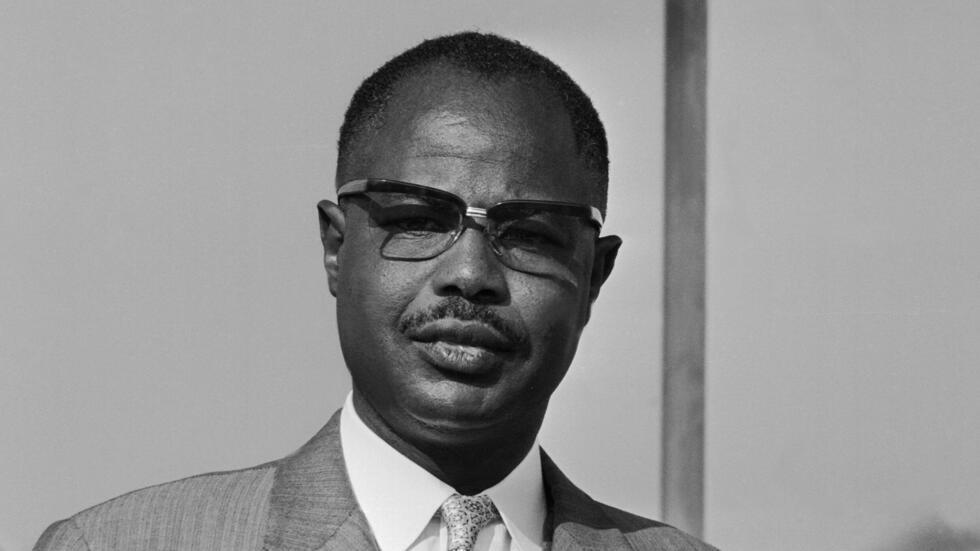
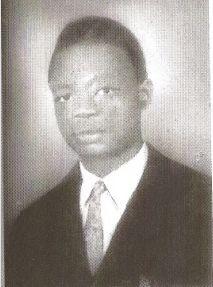
Hidden Agenda
From 2015 to 2024, the U.S. provided Cameroon with more than $1.7 billion in foreign aid, with $875 million of the total coming during the Biden administration. From 2001 to 2014, U.S. foreign aid to Cameroon totaled $277 million.[11]
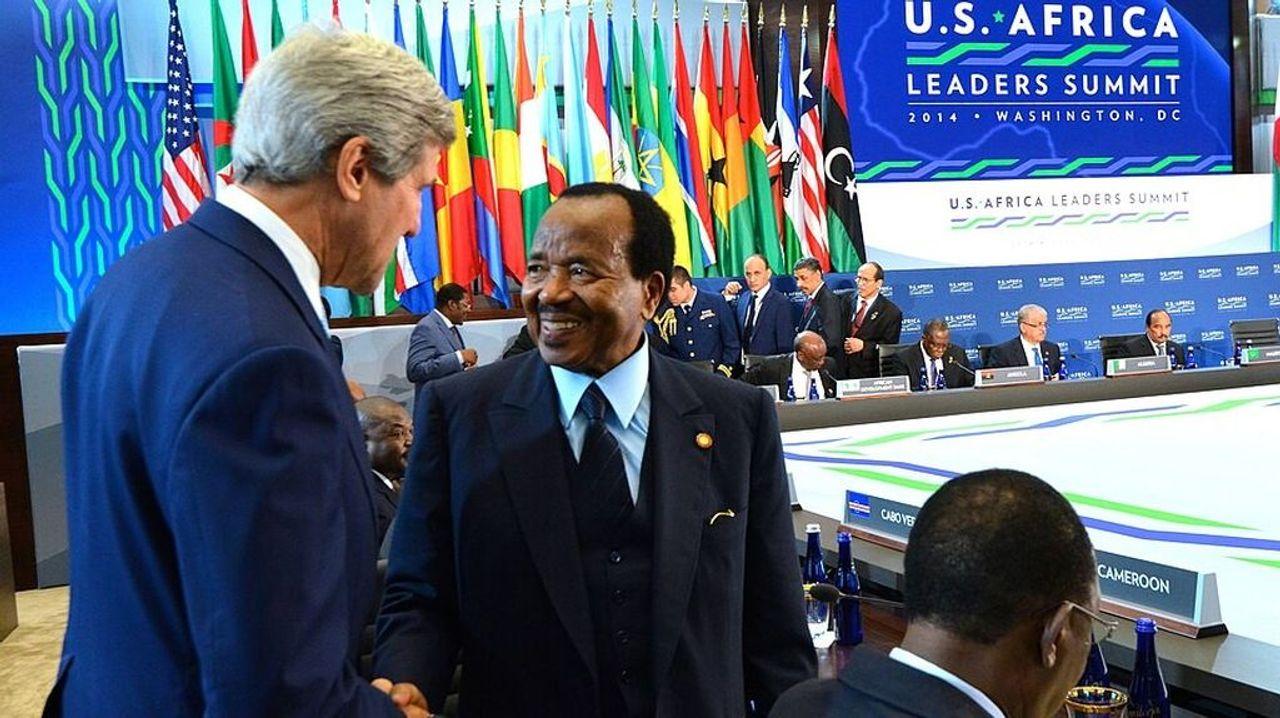
While packaged as purely humanitarian, U.S. aid was largely a form of payback for Biya’s granting privileged access to U.S. and foreign multi-national corporations in Cameroon.
In the late 1990s, Biya greenlighted the construction of the Chad-Cameroon pipeline, which was completed in 2003. The project started as a joint venture of ExxonMobil, the Malaysian-based Petronas and Chevron.
The International Finance Corporation (IFC), the private-sector arm of the World Bank, provided $100 million of debt-based financing, and France’s export credit agency COFACE and the U.S. Export-Import Bank each provided $200 million.
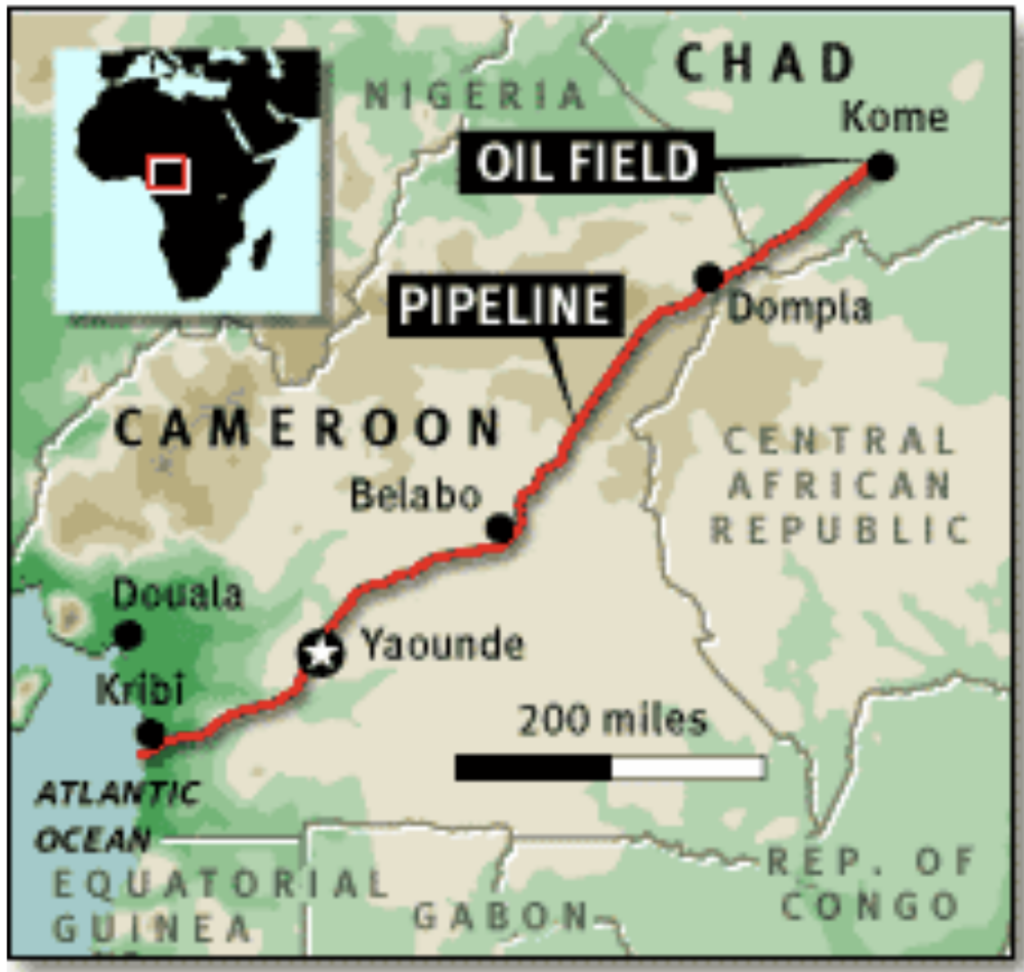
In 2009, Biya granted and then later renewed a deal with a New York-based company, Herakles Farms, to develop a large-scale palm oil plantation on 73,000 hectares of Cameroonian rain forest that, according to the Oakland Institute, contributed to “massive deforestation” while using methods that were “destructive of livelihoods for thousands of Cameroonians.”
The Herakles deal was initiated after intense lobbying by the U.S. State Department and embassy. Herakles’ CEO, Bruce Wrobel, was a donor to the Clinton Foundation and an executive with the Blackstone Group, a politically connected Wall Street firm that contributes lots of money to both the Democratic and Republican parties.[12]
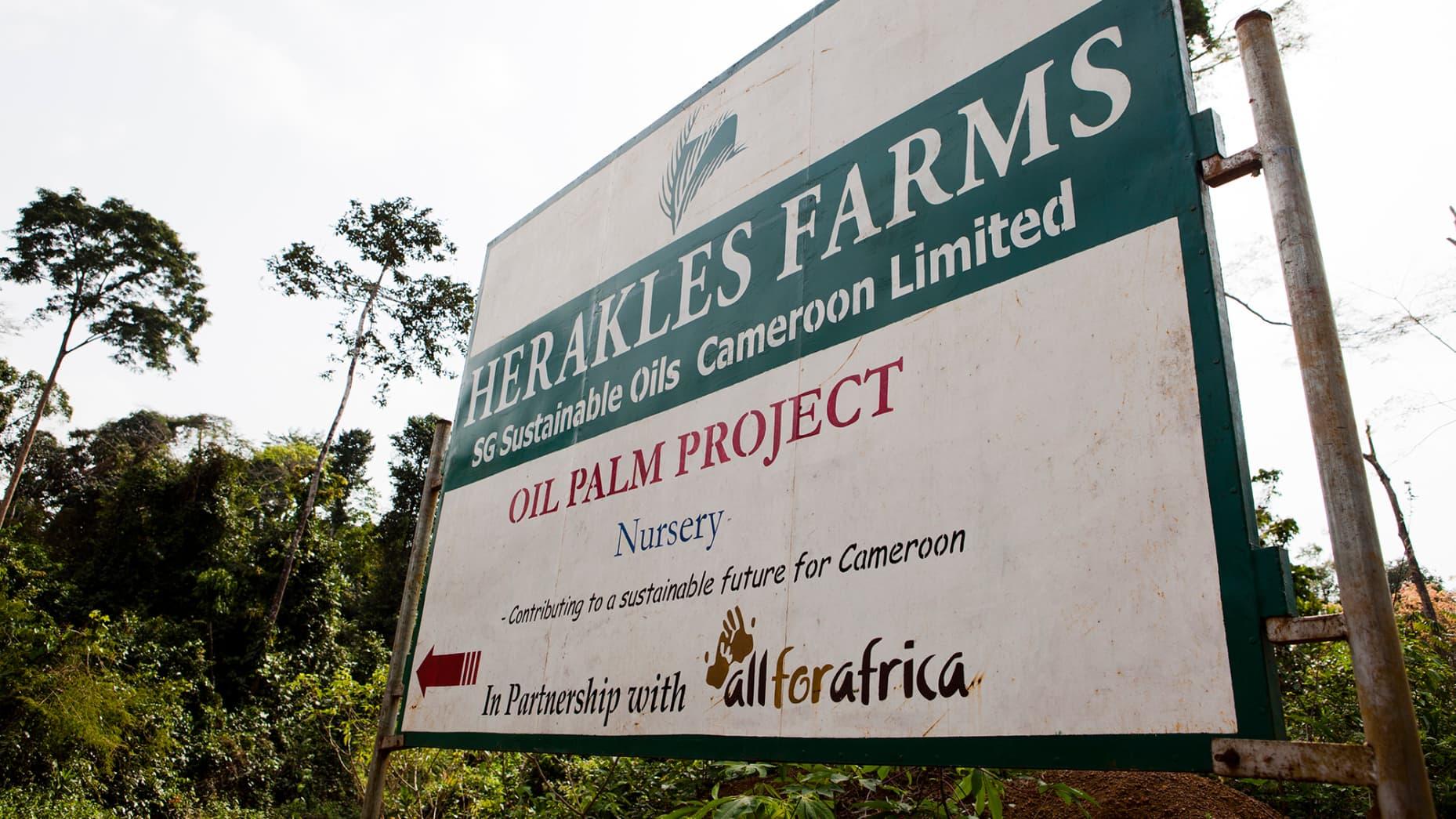
A Base for U.S. Militarists
In October 2015, the Obama administration provided six military vehicles, night-vision goggles and $9.3 million worth of surveillance drones to Biya’s government, the latter through a subsidiary of the defense giant Boeing.
The Obama administration also deployed hundreds of Green Berets to safeguard a new drone base set up, with Biya’s blessing, in Garoua in northern Cameroon.
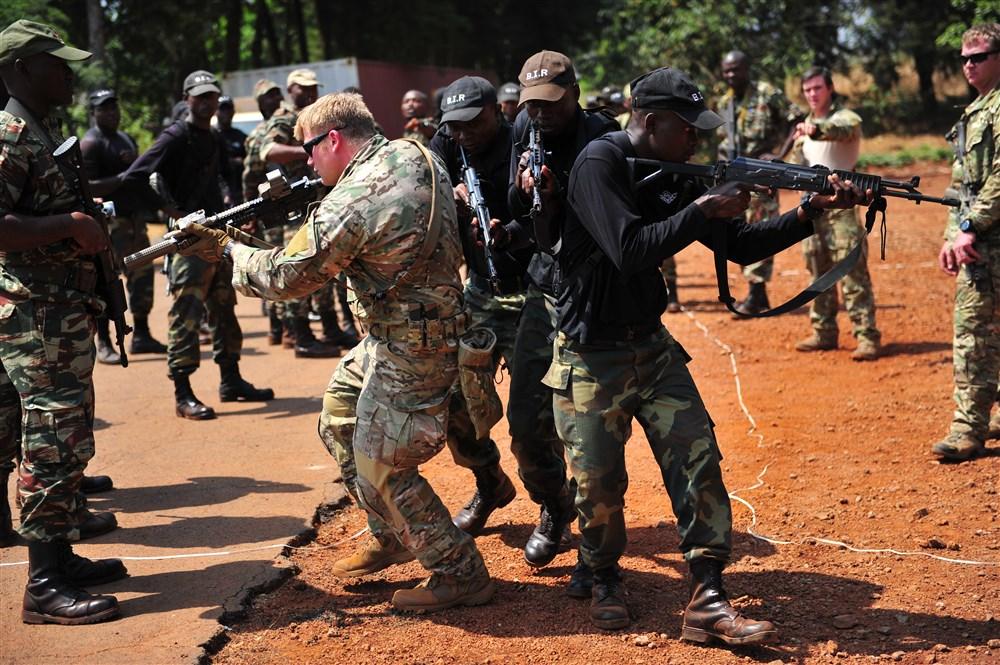
The Council on Foreign Relations (CFR) specified that the purpose of the drone base—the 13th surveillance base established by the U.S. in Africa at that time—was to provide intelligence support to the multi-national coalition fighting Boko Haram, an Islamic terrorist group that operated out of Nigeria.[13]
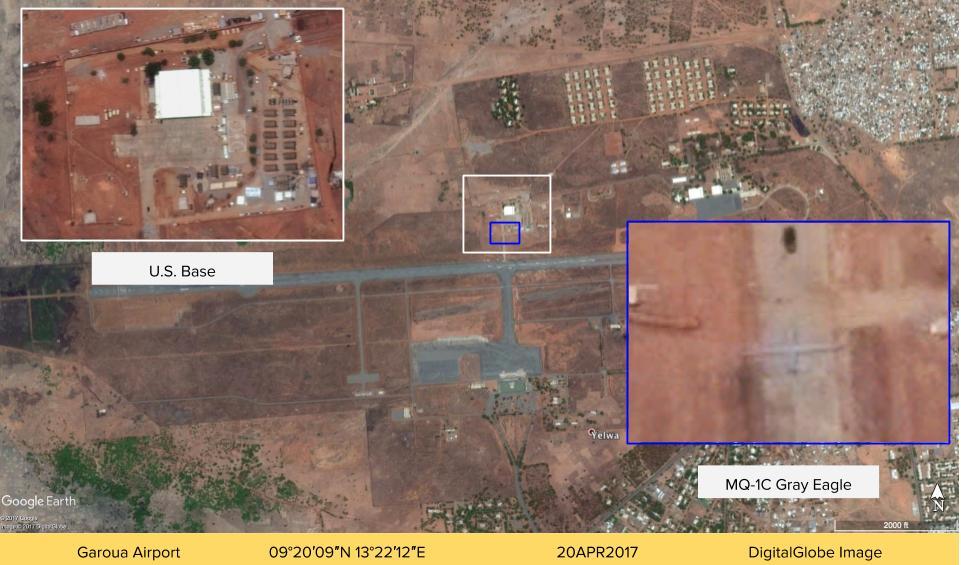
An additional U.S. military installation, in Salak in northern Cameroon, functioned as a criminal detention facility, where the Cameroonian military, with U.S. soldiers present, tortured prisoners accused of collaborating with Boko Haram, most of whom came from the Kanuri ethnic group.[14]
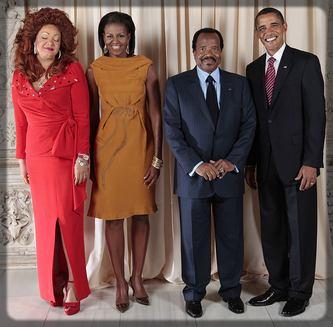
Between 2015 and 2017, the U.S. provided $111 million in security assistance to Cameroon.
The Trump I and Biden administrations further deepened military and intelligence ties, deploying more Special Forces and carrying out joint operations against Boko Haram and Anglophone separatist leaders driven to armed struggle as a result of oppressive policies.
When Biya traveled to Switzerland for medical treatment in September 2024, his security was characteristically coordinated by American advisers.
The new AFRICOM commander, Air Force General Dagvin Anderson, made a point of meeting Biya and Defense Minister Joseph Beti Assomo, signaling the continuously strong military partnership.
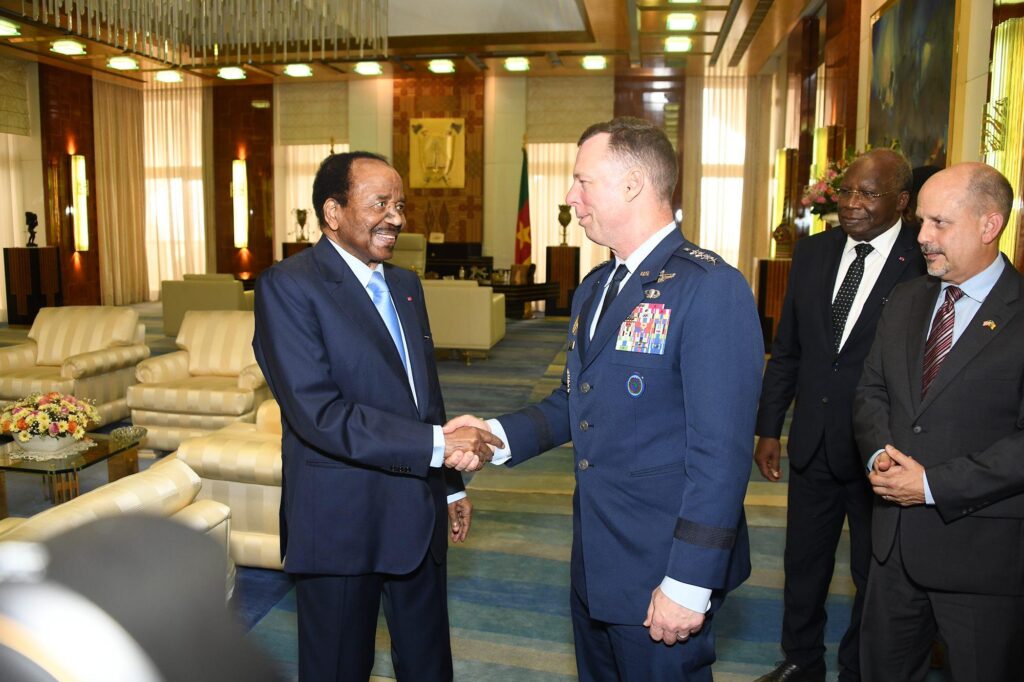
The Crimes Are Piling Up….
In March, 2022, The Intercept spotlighted U.S. Special Forces and covert operations in Cameroon that contributed to serious human rights abuses.
The article noted that, for years, several hundred U.S. Special Forces were involved in training and equipping elite Cameroonian counter-insurgents who carried out extra-judicial killings and other atrocities while fighting against Islamist militants and the Anglophone separatists.[15]
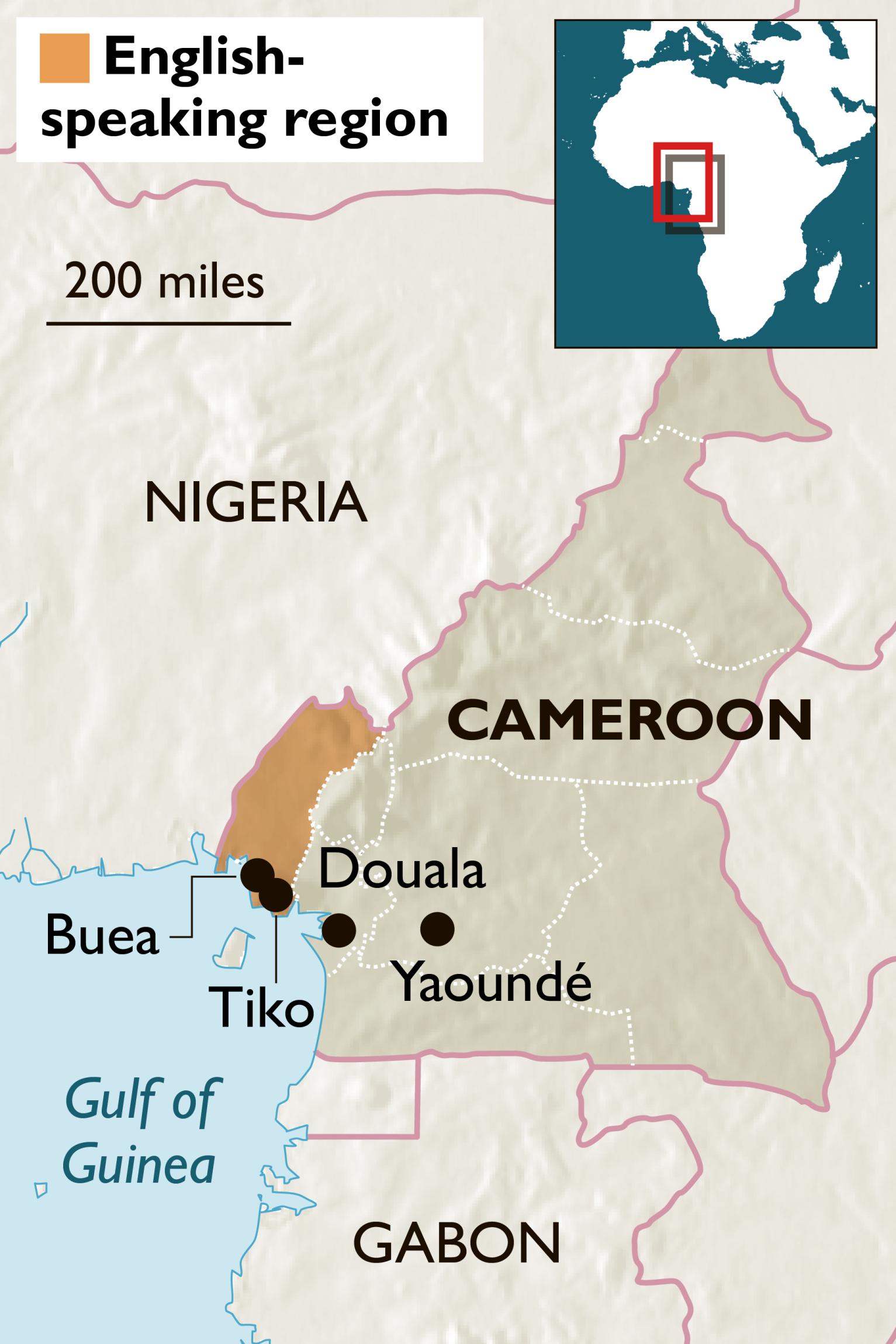
The training was carried out as part of a secret Pentagon program called 127e[16] that aimed to use native proxies to help advance U.S. strategic objectives in Africa.
Former AFRICOM Commander Thomas D. Waldhauser told Congress in 2019 that the Cameroonians “have been a good partner with us counterterrorism-wise,” though Dr. Emma Osong, a Southern Cameroonian-American human rights advocate and founder of a victims-based organization, stated that U.S.-trained forces in Cameroon “kill randomly, they arrest randomly, they arrest children, they open fire on the civilian population….The crimes are piling up.…And they are being done by a military whose funding partly comes from America.”
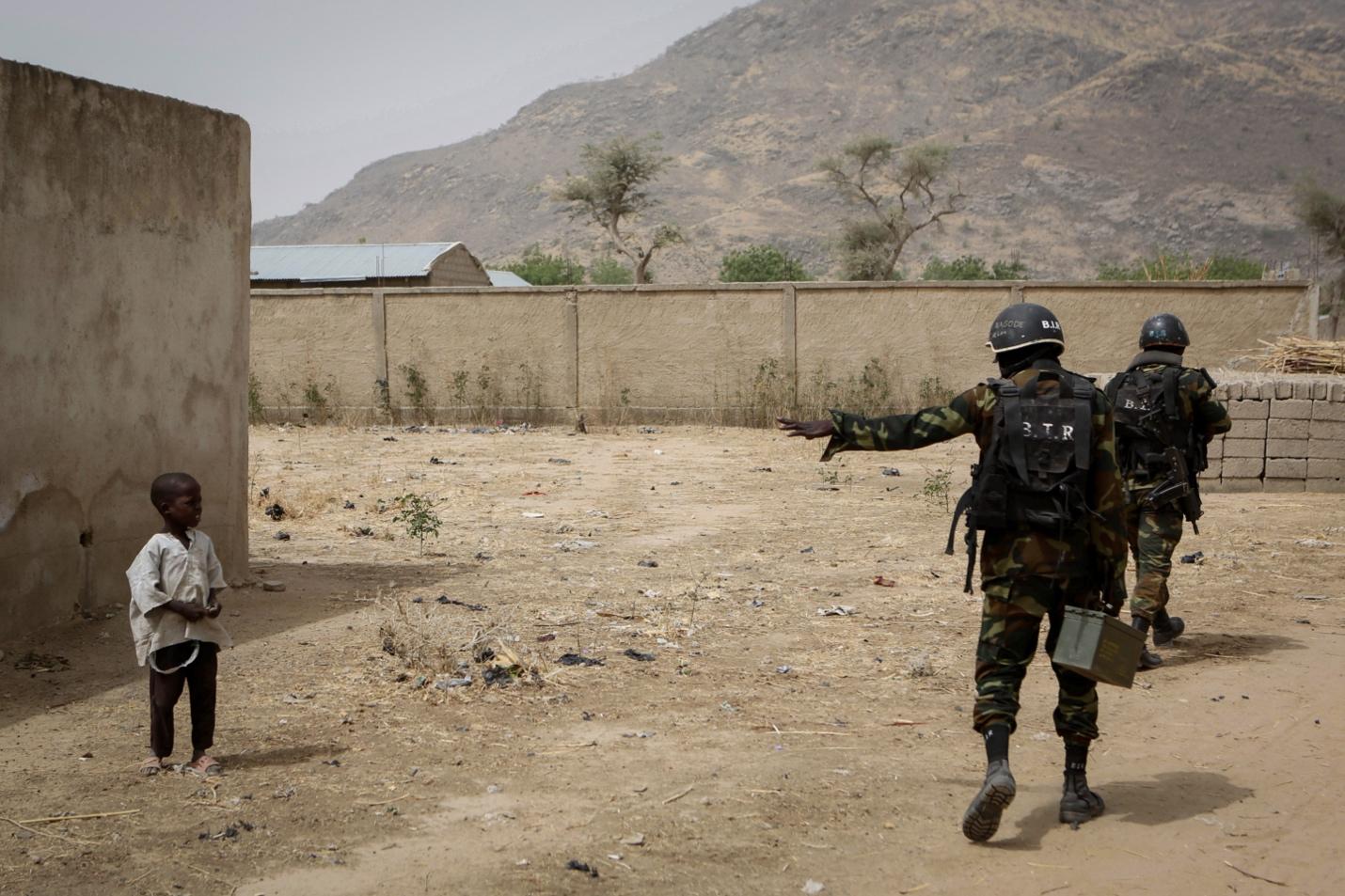
Special Relationship with Israel
After October 7, 2023, Biya expressed his unwavering support for Israel, with which he had an especially close relationship going back to the 1980s.[17]
Following a coup attempt against him in the 1980s, Biya entrusted Israelis with training his presidential guard. In 1985, Biya traveled to Zaire and saw how the Israelis trained the security apparatus of dictator Joseph Mobutu, who long enjoyed a close relationship with the CIA.[18]
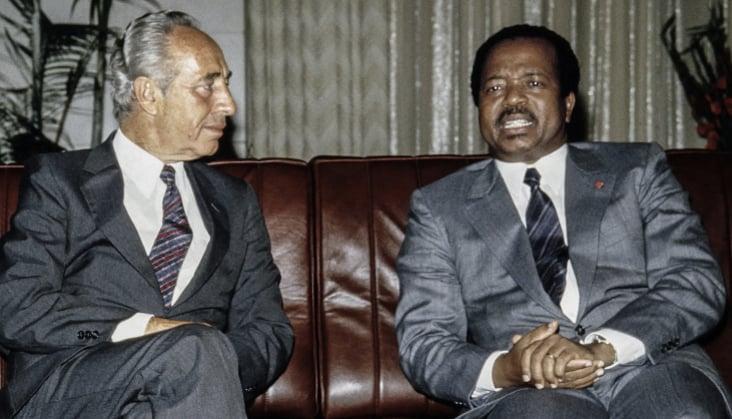
Mobutu had been particularly close with a Mossad agent named Meir Meyouhas, who went to Cameroon after his time in Zaire to help Biya create an efficient and highly ruthless spy service.[19]
The Biya regime’s security cooperation with Israel only expanded over time as the Israel Defense Forces (IDF) provided military supplies and trained military personnel, and Mossad installed a communication system in Cameroon called Helios.[20]
In the early 2000s, Colonel Abraham Avi Sivan was put in charge of recruiting and training the same commando unit that U.S Special Forces later trained and that was implicated in serious human rights abuses.
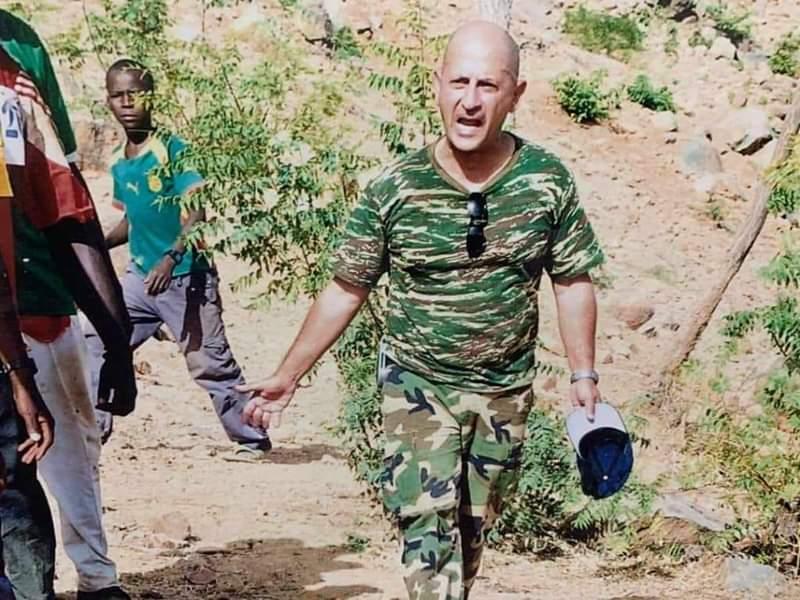
After Colonel Sivan’s death in 2010, Israeli mercenaries led by Eran Moas continued to train Cameroonian troops equipped with Tavor assault rifles manufactured by the Israeli arms manufacturer Israel Weapon Industries. The focus of the training was on urban combat and Krav Maga, a hand-to-hand fighting system developed for the IDF.[21]
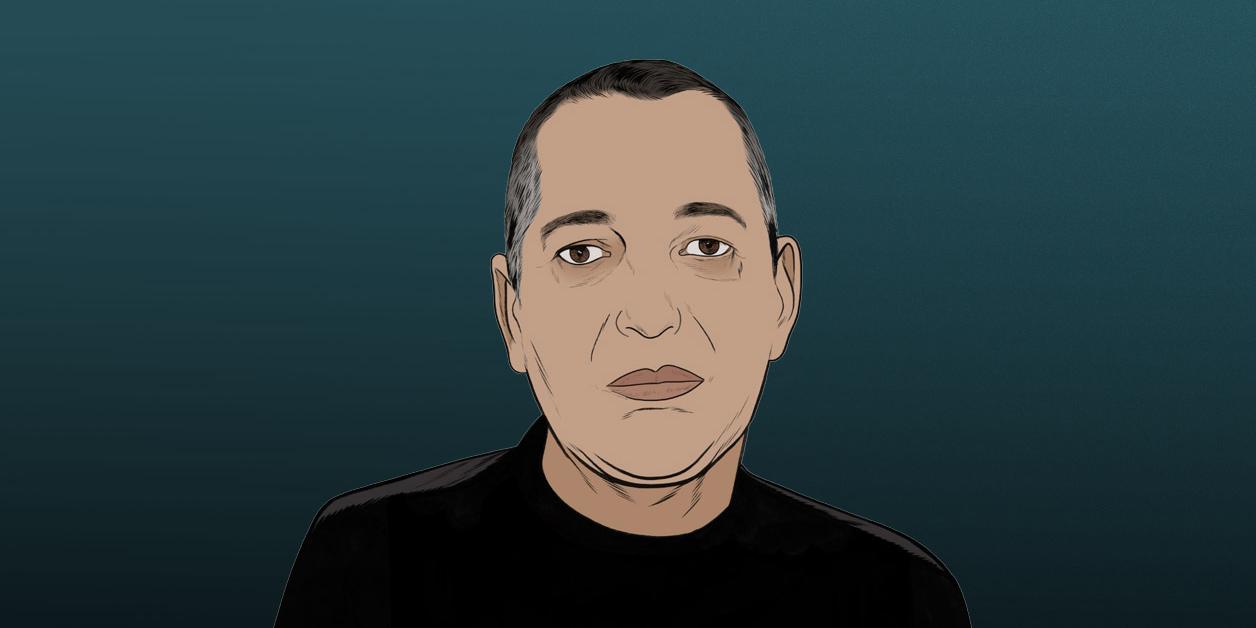
The Times They Are A-Changin’
Though few people would defend Biya at this point, the U.S. and French continue to support him as part of their efforts to sustain a neo-colonial foreign policy that has marked the post-independence era in sub-Saharan Africa.
This neo-colonialist foreign policy has come under direct challenge from the growing Chinese influence in Cameroon, which has resulted in the construction of a major hydroelectric dam, deep seaport and malaria research center.
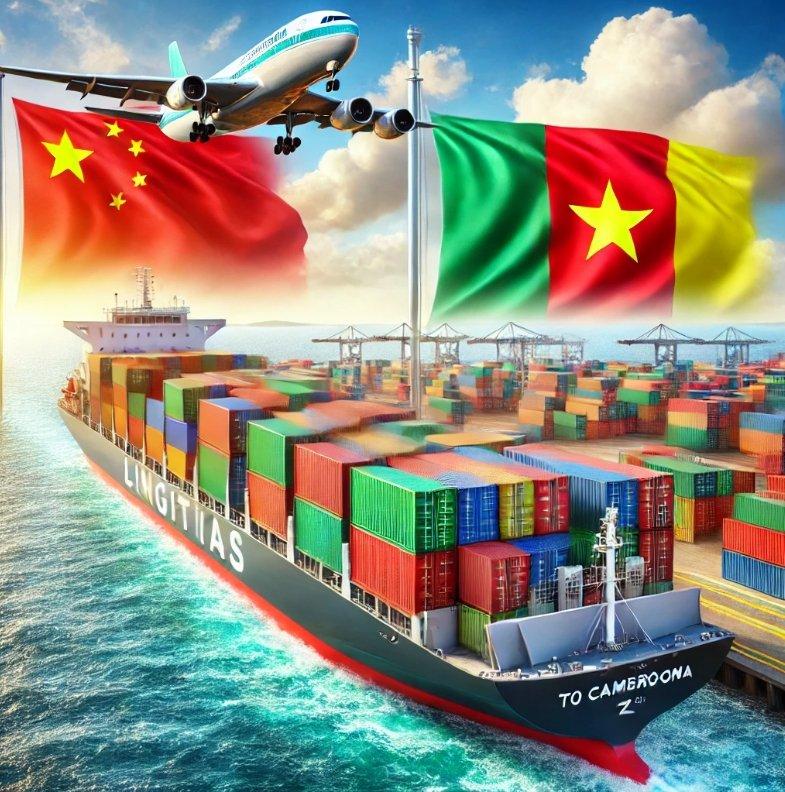
Western hegemony in Western Africa is furthermore threatened by a new alliance of Sahel states christened at a series of meetings in May 2024 in Bamako (Mali), Niamey (Niger) and Ouagadougou (Burkina Faso).
The leaders of the three Sahel states had overthrown U.S. and French-backed regimes and, in the case of Niger, closed down a large U.S. drone base at Agadez.
Historian Vijay Prashad noted that the Alliance of Sahel States draws inspiration from the Pan-Africanist movement of the 1960s, whose aim was to establish genuine political and economic sovereignty and a united front against the Western powers.
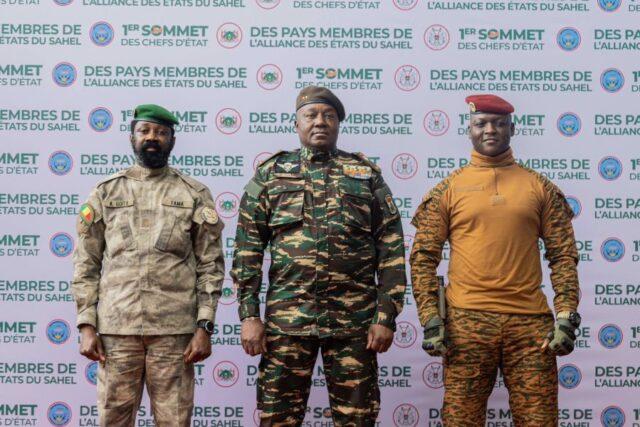
In a powerful speech at the Alliance of Sahel States summit in July 2024, Burkina Faso leader Ibrahim Traoré stated that “the imperialists see Africa as an empire of slaves” and believe that “Africans belong to them, our lands belong to them, our subsoils belong to them….Niger’s uranium lights up Europe, but its own streets remain dark…This has to change.”
Traoré supported new agreements at the summit designed to enhance trade between the Sahel states, to create a stabilization fund in place of dependence on the IMF and to develop an investment bank rather than to rely on the World Bank.
These policies are ones that have long been resisted by Paul Biya, which is why the Trump administration continues to support him like Reagan did all those years ago.

The firms included Bank of America, Bank of Boston, Chase Manhattan Bank and Del Monte, among others. Joseph Takougang, “The Demise of Biya’s New Deal in Cameroon, 1982-1992” and Julius A. Amin, “Paul Biya’s Foreign Policy,”in The Leadership Challenge in Africa: Cameroon Under Paul Biya, ed. John Mukum and Joseph Takougang (Trenton, NJ: Africa World Press, 2004), 99, 100, 167. In 1990, Cameroon created an Industrial Free Zone (IFZ), which gave foreign investors comparative advantages, including property ownership, transfer of capital and complete expropriation compensation. In 1986, Biya also lowered taxes on American oil companies operating in Cameroon. ↑
Biya’s current term will expire in 2032 at which time, if he survives, he will be nearing 100 years old. ↑
The election was marked by ballot-stuffing, intimidation and the barring of opposition candidates from running. ↑
Janvier Tchouteu, Paul Biya of Cameroon: Three-Plus Decades of Misrule Under an Anachronistic French-Imposed System (New York: Tisi Books, 2013), 81. ↑
At least 23% of the population live on less than $2.15 (U.S. dollars) a day. When deprivation in education, health and living conditions are included, the share rises to more than 40%. The rural masses face the worst conditions, with more than 56% counted among the poor in contrast to around 21% in urban areas. ↑
Alejandro López, “Protests sweep Cameroon after 92-year-old Paul Biya declared president again,” World Socialist Web Site, October 29, 2025. ↑
Considered the “Pearl of Africa” because of its rich resources, Cameroon was first colonized by Germany and then by both England and France after World War I. ↑
See Thomas Deltombe et al., The Cameroon War: A History of French Neocolonialism in Africa, rev ed. (London: Verso, 2025). The French adopted the same tactics as they did in suppressing nationalistic rebellions in Algeria and Indochina, including torture, bombing, forced relocation, assassination and psychological warfare. ↑
Tchouteu, Paul Biya of Cameroon, 45, 46. A graduate of the Institut des Hautes Etudes d’Outre-Mer in France where he obtained a law degree, Biya served in Ahidjo’s cabinet starting in 1964. In the late 1990s, Transparency International rated Cameroon the most corrupt country in the world. The Leadership Challenge in Africa, ed. Mbaku and Takougang, 21. ↑
Tchouteu, Paul Biya of Cameroon, 35, 37. ↑
Biya was among the African leaders invited to Washington by the Biden administration in December 2022 for the U.S.-Africa Leaders Summit. Embarrassingly, he appeared to be senile at the summit and unaware of his surroundings. In 2024, the CIA linked National Endowment For Democracy (NED) provided $650,500 in grants to Cameroon. ↑
See Elizabeth Fraser and Frederic Mosseau, Backroom Bullying: The Role of the US Government in the Herakles Farms’ Land Grab in Cameroon (Oakland, CA: The Oakland Institute, 2016). The project also violated multiple laws. In 2013, Wroebel was alleged to have committed suicide, though there are grounds to suspect foul play. ↑
The CFR characteristically failed to mention that Boko Haram and other Islamic insurgent groups had grown exponentially in response to the U.S. militarization of sub-Saharan Africa and support for oppressive regional security forces along with unjust economic policies that fueled wide social inequality and despair among youth prone to join insurgent or terrorist groups. See Nick Turse, The Changing Face of Empire: Special Ops, Drones, Spies, Proxy Fighters, Secret Bases, and Cyberwarfare (Chicago: Haymarket Books, 2012). ↑
Men detained at the facility said they saw white men around who must have been Americans. Detainees described a routine process by which the Cameroonian forces would wrap the corpses of the detainees that they had tortured to death in plastic and transport their bodies off the site. The U.S. also maintained a military outpost in Douala Cameroon. On Obama’s larger neo-colonialist policy in sub-Saharan Africa, see Jeremy Kuzmarov, Obama’s Unending Wars: Fronting the Foreign Policy of the Permanent Warfare State (Atlanta: Clarity Press, 2019), ch. 4. ↑
The equipment the U.S. provided included surveillance drones, armored vehicles and small arms, according to The Intercept. U.S. Ambassador to Cameroon Michael Hoza claimed that, “in their training, conduct, and leadership, the BIR [special commando unit trained by the U.S.] exhibited all of the values we expect in our own armed forces—professionalism, protection of the civilian population, and respect for human rights.” This was contradicted by the State Department’s own reporting, Amnesty Internationl and journalists who detailed how the Cameroonian forces trained by the U.S. committed a litany of atrocities, including burning entire villages.Thousands of refugees from the conflict fled to Mexico and were seeking asylum in the U.S. (many were in turn detained by ICE). ↑
According to The Intercept, the 127e program was authorized by Secretary of Defense Chuck Hagel in 2014. ↑
Cameroon under Biya was the only country in Africa not to recognize a Palestinian state. In 1991, Cameroon voted for a resolution declaring null the 1975 UN resolution equating Zionism with racism. Biya personally oversaw the Israeli dossier from his office at the Etoudi Palace. His Chief of Staff, Benae Mpecke, made numerous trips to Tel Aviv. ↑
See Zach Levey, “Israel’s Strategy in Africa, 1961-67,” International Journal of Middle East Studies, 36 (2004), 76. ↑
Franck Foute, “Paul Biya, Israel’s strongest ally in Africa?” The Africa Report, October 31, 2023; Andrew and Leslie Cockburn, Dangerous Liaison: The Inside Story of the U.S.-Israeli Covert Relationship (New York: Harpercollins, 1991), 112. Meyouhas had been imprisoned after carrying out terrorist attacks in Egypt in 1954 known as the “Lavon Affair” that were designed to create a pretext for a war on Gamal Abdel Nasser. Subsequently, he received only a light prison sentence. Meyouhas became very wealthy as a result of his investments in the Congo. ↑
Foute, “Paul Biya, Israel’s strongest ally in Africa?” ↑
Jane Flanagan, “Cameroon leader’s reliance on private army plays into Israeli ambitions,” The Asia Times, July 14, 2020. Like Meyouhas and Sivan, Moas made a fortune as a mercenary, enabling him to buy luxury properties in New York and Los Angeles. ↑
CovertAction Magazine is made possible by subscriptions, orders and donations from readers like you.
Blow the Whistle on U.S. Imperialism
Click the whistle and donate
When you donate to CovertAction Magazine, you are supporting investigative journalism. Your contributions go directly to supporting the development, production, editing, and dissemination of the Magazine.
CovertAction Magazine does not receive corporate or government sponsorship. Yet, we hold a steadfast commitment to providing compensation for writers, editorial and technical support. Your support helps facilitate this compensation as well as increase the caliber of this work.
Please make a donation by clicking on the donate logo above and enter the amount and your credit or debit card information.
CovertAction Institute, Inc. (CAI) is a 501(c)(3) non-profit organization and your gift is tax-deductible for federal income purposes. CAI’s tax-exempt ID number is 87-2461683.
We sincerely thank you for your support.
Disclaimer: The contents of this article are the sole responsibility of the author(s). CovertAction Institute, Inc. (CAI), including its Board of Directors (BD), Editorial Board (EB), Advisory Board (AB), staff, volunteers and its projects (including CovertAction Magazine) are not responsible for any inaccurate or incorrect statement in this article. This article also does not necessarily represent the views the BD, the EB, the AB, staff, volunteers, or any members of its projects.
Differing viewpoints: CAM publishes articles with differing viewpoints in an effort to nurture vibrant debate and thoughtful critical analysis. Feel free to comment on the articles in the comment section and/or send your letters to the Editors, which we will publish in the Letters column.
Copyrighted Material: This web site may contain copyrighted material the use of which has not always been specifically authorized by the copyright owner. As a not-for-profit charitable organization incorporated in the State of New York, we are making such material available in an effort to advance the understanding of humanity’s problems and hopefully to help find solutions for those problems. We believe this constitutes a ‘fair use’ of any such copyrighted material as provided for in section 107 of the US Copyright Law. You can read more about ‘fair use’ and US Copyright Law at the Legal Information Institute of Cornell Law School.
Republishing: CovertAction Magazine (CAM) grants permission to cross-post CAM articles on not-for-profit community internet sites as long as the source is acknowledged together with a hyperlink to the original CovertAction Magazine article. Also, kindly let us know at info@CovertActionMagazine.com. For publication of CAM articles in print or other forms including commercial internet sites, contact: info@CovertActionMagazine.com.
By using this site, you agree to these terms above.
About the Author

Jeremy Kuzmarov holds a Ph.D. in American history from Brandeis University and has taught at numerous colleges across the United States. He is regularly sought out as an expert on U.S. history and politics for radio and TV programs and co-hosts a radio show on New York Public Radio and on Progressive Radio News Network called “Uncontrolled Opposition.”
He is Managing Editor of CovertAction Magazine and is the author of six books on U.S. foreign policy, including Obama’s Unending Wars (Clarity Press, 2019), The Russians Are Coming, Again, with John Marciano (Monthly Review Press, 2018), Warmonger. How Clinton’s Malign Foreign Policy Launched the U.S. Trajectory From Bush II to Biden (Clarity Press, 2023); and with Dan Kovalik, Syria: Anatomy of Regime Change (Baraka Books, 2025).
Besides these books, Kuzmarov has published hundreds of articles and contributed to numerous edited volumes, including one in the prestigious Oxford History of Counterinsurgency .
He can be reached at jkuzmarov2@gmail.com and found on substack here.

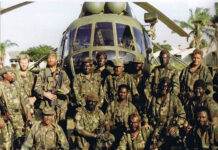
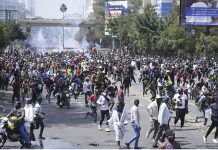

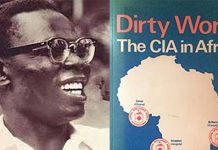
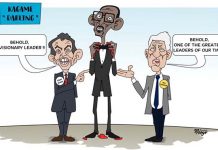
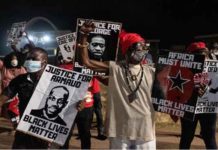

Terrific article. Really fantastic. Biya has certainly been a bad dictator. Cameroon’s support for Israel is insignificant in comparison to Iran’s support for Hamas, a terrorist organization whose goal from its very inception was the destruction and eradication of Israel.
The two forms of support are vastly different in scale, nature, and consequence. Iran’s actions involve material and military support for a non-state actor engaged in armed conflict with a sovereign state, with significant and direct impacts on regional security and the potential for a wider conflagration. Cameroon’s support, while providing specific security benefits to its own government, is a relatively minor diplomatic and bilateral relationship with little to no bearing on the dynamics of the Middle East conflict. Therefore, Iran’s support for Hamas is widely perceived as more severe and impactful.
Ron Paul said that Israel founded Hamas and it divide the Palestinians because Hamas is made up of lunatics who are destroying the chances of the Palestinians having their own state.
I believe him.
I don’t believe Hamas, because I don’t think they did anything useful with their kidnapping of drunks at a party.
The IAEA would deserve to go to the Zaporozhye power plant, and Azov would blow up the power plant and the IAEA.
Russia is a traitorous state made up of Khazars and Putin’s mother was a Khazar Jewess. Shelomova was her maiden name and that’s enough to know that Iranians are as stupid as a drunk night because it trust Putin.